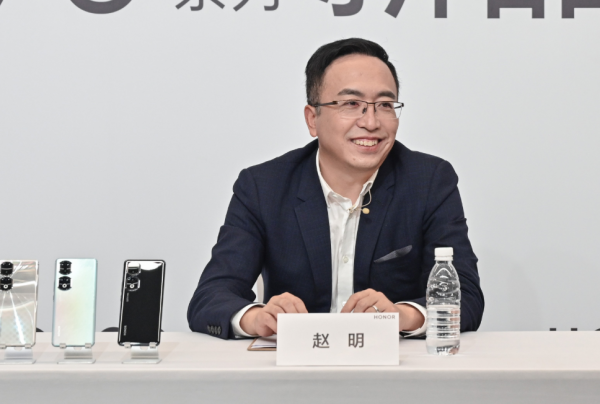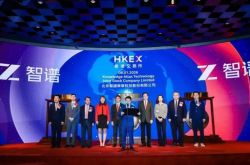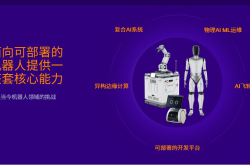Honor Announces CEO Transition: New Leader Faces Critical Challenges
![]() 01/20 2025
01/20 2025
![]() 471
471

After a series of events, including rumors, refutations, and official announcements, Zhao Ming, CEO of Honor, confirmed his departure from the company. This announcement came just over half a month after he delivered an upbeat New Year speech on the last day of 2024.
On the 17th, Honor officially announced on its internal network that Zhao Ming had resigned from his positions as director and CEO due to personal reasons. The board of directors has appointed Li Jian to take over Zhao Ming's duties.
In the afternoon of the announcement, at 16:31, Zhao Ming published a lengthy letter titled "Farewell, My Brothers and Sisters at Honor!" on the company's internal network.
In the letter, Zhao Ming mentioned that choosing to leave Honor was the most difficult decision of his life. Over the past decade, Honor had been nearly synonymous with his life, and he "regretted not being able to lead the team through the changes."
A decade has flown by! In 2015, Zhao Ming took over as president of the Honor Business Unit and was fully responsible for its operations until November 2020, when Huawei announced the sale of the entire Honor business, and Zhao Ming became the CEO of the newly independent Honor. Zhao Ming has been closely associated with Honor throughout this journey.
Reflecting on the past 10 years, Zhao Ming once said with deep emotion, "Every moment of the past 10 years has been filled with trepidation and I have walked on thin ice. I have rarely experienced the joy of success and have always been thinking about how to keep the team alive and come out on top." Now, with an internal appointment, Honor, which has been running at full speed, is ushering in a change of leadership. Zhao Ming has suddenly come to a halt in his busy schedule and become calm.
Zhao Ming's resignation was unexpected but inevitable. It coincided with a critical moment for the IPO, and there have been various interpretations regarding the change of leadership at Honor. The challenges facing Honor will not disappear due to the change of leadership, and the successor will face challenges no smaller than those faced by Zhao Ming. The IPO, the decline in market share, and Honor's globalization are mandatory questions for the new CEO.
Departure: Sudden Yet Inevitable
Indeed, Zhao Ming's departure was quite sudden. On the last day of 2024, Zhao Ming delivered a New Year speech for 2025, in which he mentioned that they would unwaveringly advance the strategies of AI and brand premiumization and promote a positive cycle and sustainable growth of global operations.
Additionally, Zhao Ming mentioned that Honor's overseas sales accounted for more than 50% in December 2024 and achieved large-scale profitability in many places, truly becoming an international enterprise. At that time, Zhao Ming was full of ambition and high spirits, but just over half a month later, it was time to leave, which surprised both the industry and the outside world.
More importantly, 2024 was a year of shareholding reform for Honor. The reform was successfully completed at the end of 2024, and the company's name was changed from "Honor Terminal Co., Ltd." to "Honor Terminal Co., Ltd." With the completion of the shareholding reform, Honor will initiate the IPO process in due course. It can be said that Honor is in a critical period for its IPO, and external attention towards it is increasing.
In terms of financing, Honor was also very active in the second half of 2024. On October 31, 2024, Honor received a round of financing, introducing new shareholders including China Telecom, funds under China International Capital Limited Corporation, funds under Cornerstone, Shenzhen Special Zone Development (Group) Co., Ltd., and a new round of agent investment platforms (Jinshi Xingyao).
On December 18, 2024, there was a change in Honor's shareholders. Hangzhou Weitong Equity Investment Partnership (Limited Partnership) withdrew, and seven new enterprises were added, including Jinshi Xingyao (Shenzhen) Smart Device Private Equity Investment Fund Partnership (Limited Partnership), Jiaxing Teyao Zhongchuang Venture Capital Partnership (Limited Partnership), and Ma'anshan Jinrui Jishi Equity Investment Partnership (Limited Partnership).
As of now, Honor's shareholder base consists of 23 shareholders. In addition to the shareholders introduced on October 31, 2024, they also include Shenzhen Zhixin New Information Technology Co., Ltd., Shenzhen Pengcheng New Information Technology Partnership (Limited Partnership), Shenzhen State-owned Assets Collaborative Development Private Equity Partnership (Limited Partnership), BOE Technology Group Co., Ltd., and China Mobile, among others.
Honor has numerous shareholders, including state-owned assets, mobile phone supply chains, telecommunications operators, and Honor agents, among others. They all have clear expectations for Honor's future and hope that Honor can go public as soon as possible to realize cash-in and even exit.
At this critical moment for the IPO, performance is naturally the top priority. Zhao Ming once said in an internal letter that the company achieved its profit and bonus budget targets in 2024, with good earnings and impressive achievement rates for revenue and sales volume. He looked forward to Honor being able to reach new heights in 2025.
However, the mobile phone market competition is intense, and market performance tells a different story. According to Canalys' data on China's smartphone market in 2024, vivo led the market with a 17% share and shipped 49.3 million units; Huawei ranked second with 46 million units shipped, a year-on-year increase of 37%; Apple, OPPO, and Honor followed closely, ranking third, fourth, and fifth respectively, with market shares of 15% each. Honor's market ranking in 2024 was already lower than that of 2023.
What is more concerning to the outside world is that according to the Q4 2024 China smartphone market shipment rankings, Honor has fallen out of the top five. In Q4 2023, Honor ranked second, which is unacceptable to Honor's shareholders. As CEO, Zhao Ming must bear responsibility for the current situation. Therefore, Zhao Ming's departure is also inevitable.
At the moment of departure, Zhao Ming revealed two important pieces of information: first, his shares are still in the company, suggesting that his own interests are still closely related to Honor; second, his future plans are to rest and learn, implying that he will not return to his former employer, Huawei.
In any case, one thing is certain: the era of Zhao Ming at Honor has ended. The rights and wrongs, successes and failures, will be left for others to judge. The future direction of Honor has become a concern for the industry.
New CEO Faces Three Critical Questions
According to information, the new CEO, Li Jian, joined Huawei in 2001 and has been a member of Huawei's Supervisory Board since 2017, with experience in strategic management and global layout. Li Jian is known in the industry as a "Huawei warrior" and has participated in major reforms and strategic formulations at Huawei, with outstanding performance in many important battles.
In 2021, Li Jian joined the independent Honor and has successively held positions such as a core member of the management team, vice chairman, director, and president of the Human Resources Department.
Some industry insiders believe that the change of leadership at Honor indicates that the company is preparing for its IPO, and there may be some subsequent changes within the internal team. Zhao Ming has also expressed similar views on Honor's IPO-related issues in multiple media communications, stating that going public is a matter for the board of directors to be responsible for, and his job was to run the company well and provide a good product experience.
A coin always has two sides. Executive changes during the IPO process may also be interpreted by the market as a signal of internal problems or poor operating conditions within the company, affecting the market's expectations for the company's future development, reducing investors' enthusiasm for subscribing to the company's IPO, and increasing the difficulty and cost of the company's IPO. Therefore, Zhao Ming's departure has a significant impact on Honor.
When it comes to going public, Honor's valuation must be mentioned. Last August, a pre-IPO financing plan for Honor was rumored in the market, showing that the company was valued at 200 billion yuan at that time, but this plan was not confirmed by Honor.
For comparison, among the currently listed mobile phone manufacturers in China, Xiaomi Group currently has a market capitalization of HK$843.5 billion, and Transsion Holdings has a market capitalization of RMB 103 billion. If Honor successfully goes public, it will become the second mainstream domestic mobile phone manufacturer to enter the capital market after Xiaomi.
As mentioned earlier in this article, with the continuous decline in market share and changes in market competition, can Honor maintain its current valuation and continue to improve it? Can Honor's performance gain market recognition during the IPO process? This is a critical question for the new CEO, Li Jian.
The second critical question for Li Jian is market share. In the first quarter of 2024, Honor mobile phones had their moment in the spotlight, with a 17.1% share of shipments in the Chinese market, surpassing Huawei. During this quarter, Honor's shipments in the high-end market above $600 increased by 123.3% year-on-year, ranking among the top three in the high-end market.
According to Canalys data, Honor's market share has shown an overall fluctuating downward trend in the past three years, dropping from 20% in the first quarter of 2022 to just under 15% in the fourth quarter of 2024.
Correspondingly, Huawei's market share has been continuously increasing after its return in 2024, maintaining a high growth rate every quarter. From Q1 to Q4 2024, Huawei's market share in mainland China was 17%, 15%, 16%, and 17%, respectively. At the same time, in the past four quarters, Huawei's year-on-year growth rates were 70%, 41%, 24%, and 24%, respectively.
Previously, many analysts believed that Honor's increase in market share was due to Huawei's absence and the outside world's recognition of Honor's origins within the Huawei system. Now that Huawei has returned, the market share is being redefined. So what will Honor rely on to win over consumers?
The third critical question facing Li Jian is globalization.
After taking over from Zhao Ming, Li Jian will lead the Honor team to embark on a "new journey under new challenges." The biggest imagination for this "new journey" is globalization. Overall, after Li Jian takes the helm of Honor, it is expected to add fuel to the fire of Honor's globalization journey and accelerate the pace of Chinese Honor towards the international market.
Huawei's internal publication once mentioned that when Li Jian was a product manager in Nigeria, he signed contracts worth more than US$30 million within three months and created a performance of US$400 million by the third year. Later, Li Jian was promoted to president of the West Africa Regional Department, president of the Americas Region, and other positions. It can be said that Li Jian should have more practical experience in globalization.
The Future of Honor: Globalization
In the past four years, Zhao Ming has accomplished two major tasks: first, leading the independence of Honor from Huawei; second, leading Honor to become one of China's top five mobile phone brands.
Zhao Ming's departure is not just the loss of a CEO but also the loss of a marketing influencer. For a long time in the past, Zhao Ming's energy in promoting Honor's publicity cannot be underestimated.
Zhao Ming's Weibo account has always maintained high-intensity updates, sometimes with multiple updates per day, sharing Honor's products and dynamics, deeply binding his personal IP with the Honor brand.
In the four years since Honor was spun off from Huawei, it has been doing two things: one is to stabilize the domestic market, and the other is to gradually move towards the global market. In December 2024, the overseas sales of Honor mobile phones accounted for more than 50% for the first time, which was a milestone event for Honor and a highlight of Zhao Ming's performance.
Another recent personnel change at Honor Terminals also shows the company's emphasis on overseas markets: Honor Terminals recently announced a change of leadership in China. The former president of the China region, Wang Ban, who once led Honor's strong return to the Chinese market, is now responsible for overseas and platform businesses and no longer manages the China region. Ni Jiayue has taken over as president of the China region, previously serving as president of Honor's Full Scenario Business Department.
It can be said that Honor has been laying out its globalization strategy, and going abroad is a firm path for Honor. As can be seen from the above analysis, it is more reasonable and natural for Li Jian, who has rich globalization experience, to succeed Zhao Ming.
Standing at a critical juncture for the IPO, Honor needs to revitalize its mobile phone business, maintain its domestic market share, and make good global arrangements, so that the capital market and the industry can see that Honor still has potential. Only in this way can it gain better recognition in the capital market.
All these aspirations and dreams are destined to be realized by the new CEO.







